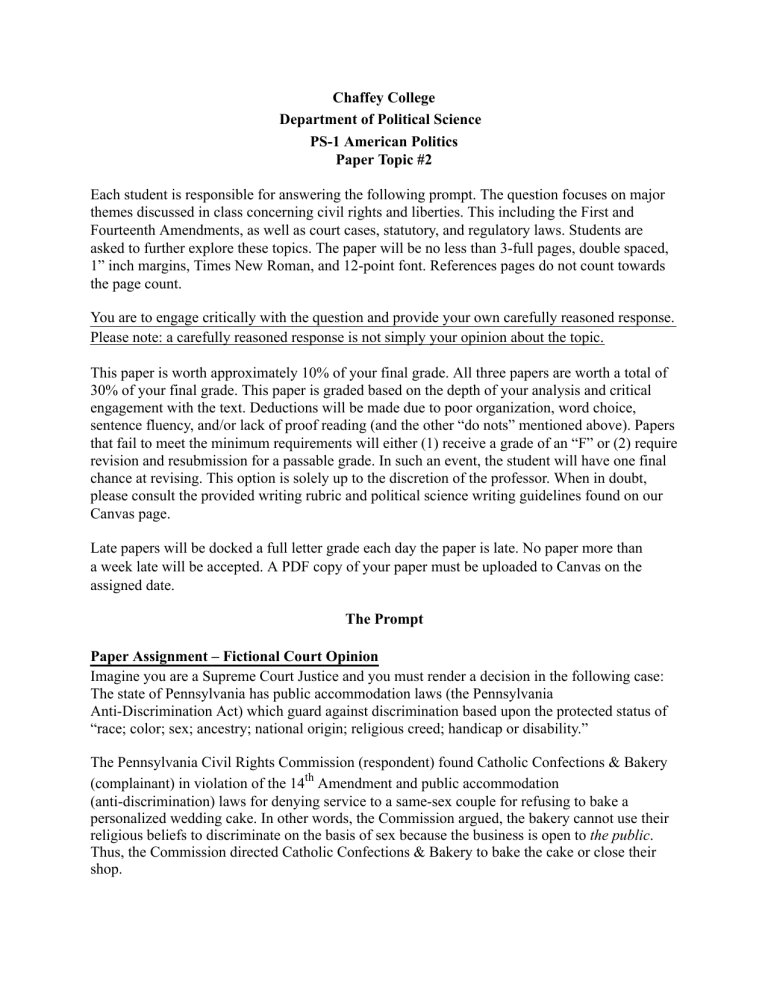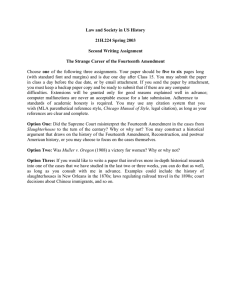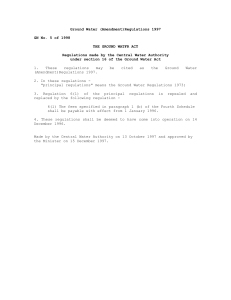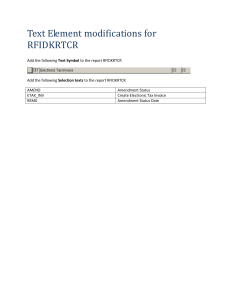
Chaffey College Department of Political Science PS-1 American Politics Paper Topic #2 Each student is responsible for answering the following prompt. The question focuses on major themes discussed in class concerning civil rights and liberties. This including the First and Fourteenth Amendments, as well as court cases, statutory, and regulatory laws. Students are asked to further explore these topics. The paper will be no less than 3-full pages, double spaced, 1” inch margins, Times New Roman, and 12-point font. References pages do not count towards the page count. You are to engage critically with the question and provide your own carefully reasoned response. Please note: a carefully reasoned response is not simply your opinion about the topic. This paper is worth approximately 10% of your final grade. All three papers are worth a total of 30% of your final grade. This paper is graded based on the depth of your analysis and critical engagement with the text. Deductions will be made due to poor organization, word choice, sentence fluency, and/or lack of proof reading (and the other “do nots” mentioned above). Papers that fail to meet the minimum requirements will either (1) receive a grade of an “F” or (2) require revision and resubmission for a passable grade. In such an event, the student will have one final chance at revising. This option is solely up to the discretion of the professor. When in doubt, please consult the provided writing rubric and political science writing guidelines found on our Canvas page. Late papers will be docked a full letter grade each day the paper is late. No paper more than a week late will be accepted. A PDF copy of your paper must be uploaded to Canvas on the assigned date. The Prompt Paper Assignment – Fictional Court Opinion Imagine you are a Supreme Court Justice and you must render a decision in the following case: The state of Pennsylvania has public accommodation laws (the Pennsylvania Anti-Discrimination Act) which guard against discrimination based upon the protected status of “race; color; sex; ancestry; national origin; religious creed; handicap or disability.” The Pennsylvania Civil Rights Commission (respondent) found Catholic Confections & Bakery (complainant) in violation of the 14th Amendment and public accommodation (anti-discrimination) laws for denying service to a same-sex couple for refusing to bake a personalized wedding cake. In other words, the Commission argued, the bakery cannot use their religious beliefs to discriminate on the basis of sex because the business is open to the public. Thus, the Commission directed Catholic Confections & Bakery to bake the cake or close their shop. The complainant argues that they should not be forced to use their unique, artistic expression to violate their deeply held and sincere religious beliefs and freedom of expression (as set forth in the First Amendment). Doing so would lead to a tyranny in which people are forced to violate their consciences. The state of Pennsylvania court system sided with the Civil Rights Commission. The complainant then appealed the case to the Supreme Court of the United States. Constitutional Background The First Amendment of the United States Constitution guarantees – amongst other things – the freedom of speech and the free exercise of religion. At the same time, the Fourteenth Amendment guarantees to all citizens the same privileges and immunities, due process rights, and equal protection of the law. Moreover, public accommodation laws prevent against discriminating based upon race; color; sex; ancestry; national origin; religious creed; handicap or disability. All of these principle guarantees of government are facing new conflict. The Broader Legal Conflict In Obergefell v. Hodges (2015), the Supreme Court of the United States declared the fundamental right to marry must be extended to same-sex couples based upon Fourteenth Amendment guarantees (Due Process Clause and the Equal Protection Clause). This is considered by many a major victory for same-sex couples who – for decades – faced rampant discrimination at the hands of government and average citizens. The Obergefell decision, combined with state public accommodation laws, protects against discrimination based upon many immutable characteristics including sexual orientation. At the same time, many religious people throughout the country are concerned that their free speech and religious liberty (“sacred right of conscience”) will be violated if – through commerce and the use of public accommodations – they are required to provide a service to same-sex couples. These religious people see accommodations (e.g. baking a custom cake) as a form of participation in the same-sex wedding. To them, this is a clear violation of their freedom of speech and religious liberty. The Court, they argue, has provided multiple exemptions in the past. Many are now requesting exemptions from generally applicable laws. Philosophical/Legal Arguments AGAINST Religious Exemptions The claim to religious liberty is nothing more than religious privilege and an old form of discrimination in a new form. The denial of service in public accommodations will clearly mean discrimination based upon traits that are protected by law (race; color; sex; ancestry; national origin; religious creed; handicap or disability). In practical terms this would mean that religious people can deny service to same-sex couples. In recent cases, the objection to providing services was based on the artistic nature of the job. For instance, baking a custom cake for a same-sex wedding versus providing an already-made generic cake. But many worry this will be furthered applied to photographers, event coordinators, event suppliers (chairs and tables) or even the venue itself. In other words, where does it end? The law should not allow for exemption from otherwise generally applicable laws based upon religious beliefs. Philosophical/Legal Arguments FOR Religious Exemptions Without these exemptions, centuries old teachings of various good-natured faiths (Protestant, Catholic, Muslim, Jewish, etc.) will face hostility and eventual extinction. The “sacred right of conscience” is foundational to human “being.” In other words, the essence of being includes the very right to make choices, to reflect, to prefer, etc. James Madison went as far as to call conscience, “the most sacred of all property.” Religious liberty has been recognized throughout the course of history and played a large role in the American founding. Hence, the First Amendment begins by discussing religious liberty. In practical terms, the failure to provide an exemption means compelling a person – through the force of law – to express speech they do not agree with and to violate their deeply held religious beliefs. This is tyranny. And a clear signal to the priest, rabbi, pastor, and Imam that their beliefs will no longer be tolerated. Without an exemption, religion faces banishment from society. The Complainant’s Legal Argument The complainant, Catholic Confections & Bakery, in the case refused to bake a custom cake for the plaintiffs on First Amendment grounds (religious and freedom of speech). According to the owners of Catholic Confections & Bakery, their faith informs them that homosexuality is a sin. In being forced to use their unique, artistic expression (creating a custom cake) they are participating in the wedding. This is a clear violation of their deeply held religious beliefs and freedom of expression. They argue that being forced to bake a custom cake is a violation of their First Amendment rights to free speech and the free exercise of religion. These values, they argue, are the most sacredly held rights of an individual and must not be infringed upon by the government. Moreover, they believe the Pennsylvania Religious Freedom Restoration Act passed in 2000 (similar to the national government’s 1993 Religious Freedom Restoration Act) provides them with an exemption from an otherwise generally applicable law. They also argue that the Court has provided many exemptions for religious people from generally applicable laws. Moreover, the Founders of America meant for exemptions to exist. Failure to provide an exemption would spell disaster for religious people in America. It means compelling religious people – who have stood against homosexuality for 2,000 years – to reject their beliefs. In other words, their deeply held and sincere religious beliefs will be violated – through the force of law – in order to express speech, they do not agree with. To argue against an exemption means the near banishment of religion in society. The Respondent’s Legal Argument The respondent, the Pennsylvania Civil Rights Commission, claims that complainant, Catholic Confections & Bakery, discriminated based upon Pennsylvania’s public accommodation laws. This law makes it illegal to deny service to anyone based upon a person’s “race; color; sex; ancestry; national origin; religious creed; handicap or disability.” The decision of the Court in Obergefell v. Hodges (2015), declared the fundamental right to marry extended to same-sex couples based upon Fourteenth Amendment guarantees. The Fourteenth Amendment guarantees all privileges and immunities, due process rights, and equal protection of the law. They claim that heterosexual and homosexual couples are entitled to purchase a custom cake from a cake shop without fear of discrimination. According to the Pennsylvania Civil Rights Commission, this is a clear violation of their civil rights at the state and national level. The same-sex couple is being discriminated against for being homosexuals (a protected class in the law). They argue that the cake baker – having refused to bake the custom cake – are violating public accommodation laws that are protected by the Fourteenth Amendment. To rule otherwise would be to allow government and private individuals to legally violate the civil rights of the LGBTQIA community. Furthermore, to allow an exemption means discrimination against protected minorities groups will turn them, once again, into second-class citizens. Paper Assignment - Fictional Court Opinion The question before you is as follows: Does the application of Pennsylvania’s public accommodations law to compel Catholic Confections & Bakery to design and make a cake that violates their sincerely held religious beliefs about same-sex marriage violate the Free Speech or Free Exercise Clauses of the First Amendment? Write a paper in which you discuss how you might rule in this case. Make sure to (1) make your decision clear, (2) explain – using a form of legal reasoning – how you came to your conclusion. Helpful Tips • Your legal reasoning does NOT have to be perfect • I want your legal opinion, not your opinion, simply • Look back to the textbook and your notes for the cases on Free Exercise Clause (NOT the Establishment Clause cases) • How has the Court ruled in the past? • Look up what legal scholars have written • Keep in mind that your ruling could have a tremendous impact on American society and law • The broad vs narrow principle: o Your decision might be broad: e.g. you ruled in favor of one group over another (religious or same-sex couple), and if so, make sure to explain why and also how that might impact the other group/society o Your decision might be narrow: e.g. you attempted to balance the interests of both groups (example: maybe some exemptions will be allowed in specific cases going forward). Be prepared to explain the rule you are creating for future cases. For instance, what cases might qualify and what cases might not? How to Organize Your Paper 1. Background of case A. What details are you going to emphasize? 2. Constitutional Issues A. Which amendments, laws, acts, and/or regulations will you discuss? 1. example: 1st amendment 2. example: 14th amendment 3. RFRA laws B. Why those amendments relate to your case C. Why those amendments were or were not violated 3. Historical support for your decision. A. Past court cases – (Show the relationship to this case) B. Quotes from past judges/experts etc. C. Why you decided the way you did according to past issues/decisions. D. What the writers of the Constitution intended. 4. Importance of your decision in the case. A. What you decided in this case B. What are the consequences now that you decided this way? • Constitutional issues (more rights taken away), social issues, safety issues, rights issues, societal, etc. C. Why was it so important for you to decide the way you did?


